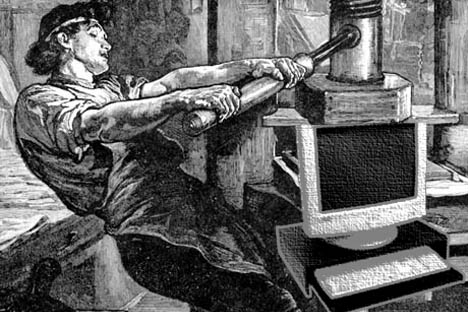
It’s very simple. As of Friday, Borders joined Amazon, Barnes and Noble, and even Apple in the new self-publishing revolution. They’re all now offering cheap-and-easy ways to self-publish an ebook. In literally seconds, you can now convert the feed for a blog into an ebook with Borders’ new service — and even give it an ISBN number. (“Edit content and drag it into chapters,” explains their web site, “then congratulations … you’re an eBook author!”)
Its slogan is “Blog to ebook in minutes,” and Borders CEO said they were “excited to give new writers and bloggers an opportunity to reach an expanded audience.” They’re launching the service — called “BookBrewer” — next Monday (October 25), and it’s part of an unmistakable trend. Just last week, Amazon announced the launch of “Kindle Singles,” a separate ebook format which is also geared for shorter-than-a-novel texts. And if you want to self-publish your book in Apple’s new iBookStore, there’s a package available at Lulu.com.
But what does this all mean? “In some ways, it’s like the early days of the Gutenberg revolution,” Business Week argued Sunday, “when authors published short manuscripts and ‘chapbooks,’ and everything in between.” The first, obvious change is that more things will get published. (The article seemed to acknowledge that boundaries were shifting, asking in its headline: “When is a Book Not a Book?”)
But inevitably, this will also create more authors.
I mean, there’s a couple of obvious technical changes here. With no need to find an agent or publisher, “The advent of tablets and e-bookstores dramatically lowers the barrier to entry for these kinds of writers….” notes Business Week. And instead of paying a commission to that agent or publisher, they can break into the world of published authors for just a small upfront payment and an ongoing commission. But it’s more exciting to focus on the end result. When I fire up my Kindle, I’ll be seeing a new kind of ebook — and one that was much less likely to exist even a few years before.
It’s ultimately not about what it means for books, or authors, or publishers, but for readers. Yes, I’m pre-supposing that there’s a micro-market for these new authors, but I think the web proves that we’re endlessly fascinated by personal stories. If you take a close look, Facebook and Twitter are really just an endless stream of very short and personal moments. C.S. Lewis once quipped that ultimately the purpose of reading is “to know that we are not alone.”
eCommerce Times found a senior analyst at Simba Information who says major publishers may actually see this as a blessing, since they can scan the best-seller lists for ebooks to determine which authors are worth publishing. (“It’s just another part of the filtering process for them.”) I want to believe that someone will devise something entirely original in these new short-form ebooks, and then find a brand new market for it. I like the way it was explained by the CEO of Borders’ new BookBrewer service. “Everyone has a story to tell, pictures to share or advice to give.
“It turns out that those are exactly the kinds of things people want to buy and read as eBooks.”
I agree that all the changes are exciting, but how do you get past the narcissism of an audience of one? Yes, we want to hear other people’s stories, but even more so, we want our story heard.
Actually, Facebook quickly turns into numbing sameness. Everyone may have pictures to share and advice to give — and most of it is bad or mediocre at best.
Now everyone has ink by the barrel, the power will go to those who can hold our attention.
I’m not sure I like that idea. Last winter I read the second place winner in a novel contest. The only reason that novel got published was because it was part of the prize. The novel had a good concept but was badly written, sturcturally unsound, and character developement was terrible. It’s hard enough, sometimes, to wade through the stuff that made it through to publication through normal procedures. I would hate to wade through increasing numbers of self-published eBooks and repeatedly running into good ideas that were so badly done. It is a waste of valuable time.